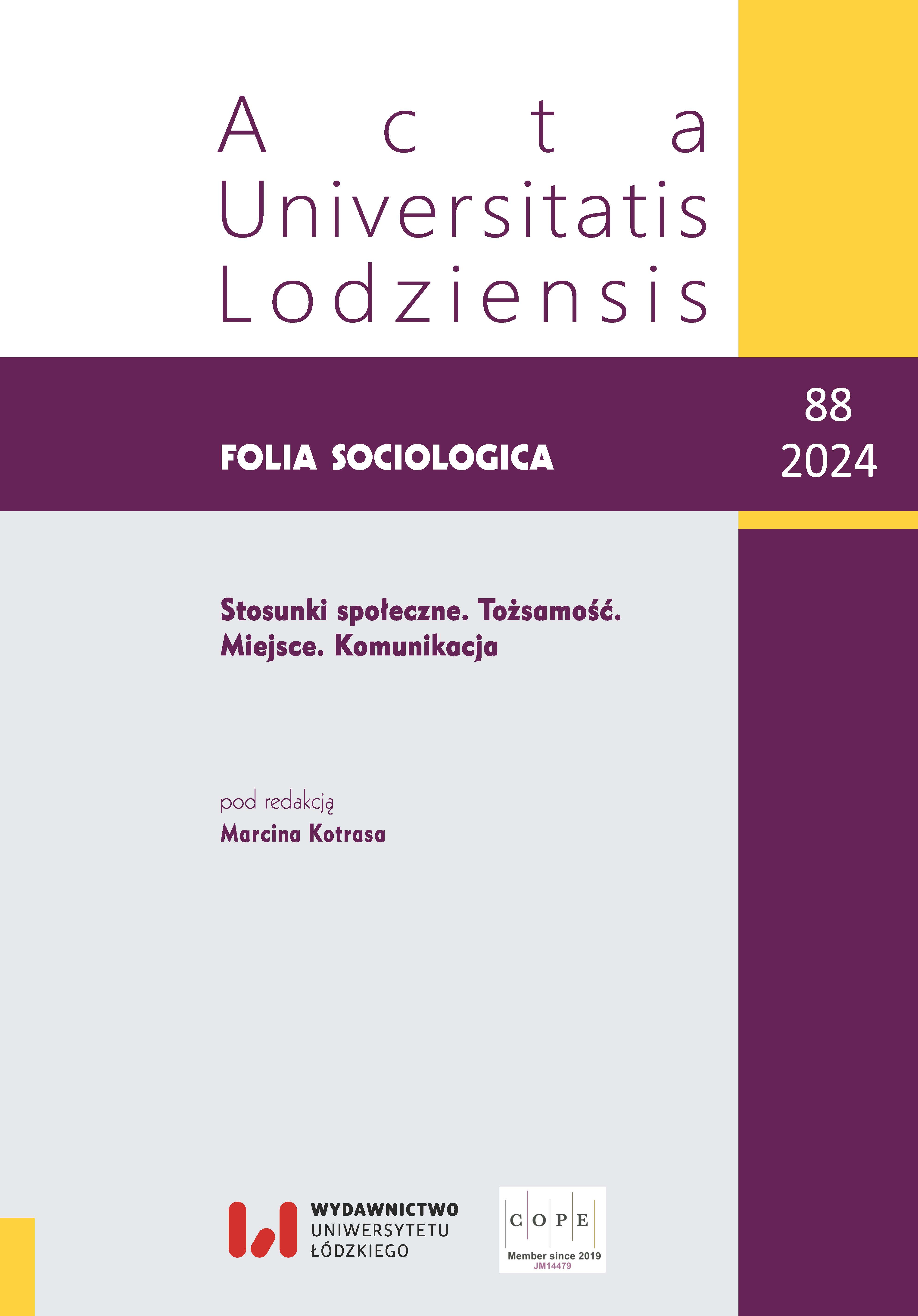Between gentry proto-racialism and scientific racism. A comparative study of the practices of oppressing others on the example of polish serfs and African-Americans
DOI:
https://doi.org/10.18778/0208-600X.88.05Keywords:
Racism, scientific racism, human race, proto-racialism, racial discourse, discursive powerAbstract
This article aims to make a comparative study of the phenomena of gentry protoracialism and modern scientific racism and to frame them, according to the functioning academic practice, in the category of socio-cultural facts. The author outlines the characteristics of the phenomena: Polish aristocratic proto-racism and the medicalisation of the notion of the human race in the United States at the turn of the 20th century, harnessed to the process of secondary prejudice against non-whites. She points out some common elements in the practices of racialising the Other in aristocratic Poland and America far removed in time. In this context, she considers racism as an analytical category that is a tool of Foucaultian discursive power, emphasising its class and dystopic nature. He draws attention to the transformations that took place in understanding the concept of race with the progressive development of the Enlightenment European ideal of scientism. He points out the characteristics and figures commonly identified with the Other. He explains their similarity with a common core derived from early European ethnocentrism.
References
Balibar É. (1991), Class Racism, [w:] Balibar É., Wallerstein I., Race, Nation, Class. Ambiguous Identities, Verso, London–New York, s. 204–216.
Google Scholar
Barroso A. (2020), Most black adults say race is central to their identity and feel connected to a broader black community. Pobrane z: https://www.pewresearch.org/fact-tank/2020/02/05/most-black-adults-say-race-is-central-to-their-identity-and-feel-connected-to-a-broader-black-community/
Google Scholar
Biondi G., Rickards O. (2002), The Scientific Fallacy of the Human Biological Concept of Race, „Mankind Quarterly”, nr 42(4), https://doi.org/10.46469/mq.2002.42.4.2
Google Scholar
DOI: https://doi.org/10.46469/mq.2002.42.4.2
Census, race and science (2000), „Nature Genetics”, t. 24, s. 97–98. https://doi.org/10.1038/72884
Google Scholar
DOI: https://doi.org/10.1038/72884
Christie R. (2010), Acting White: The Curious History of a Racial Slur, Thomas Dunne Books, New York.
Google Scholar
Czarnecki R.S. (2015). Racjonalizm vs fundamentalizm. Pobrane z: https://www.sprawynauki.edu.pl/archiwum/dzialy-wyd-elektron/325-religioznawstwo/3069-racjonalizm-vs-fundamentalizm
Google Scholar
Davis A.Y. (2022), Kobiety, rasa, klasa, Wydawnictwo Karakter, Kraków.
Google Scholar
Foucault M. (1970), Porządek dyskursu, Wydawnictwo słowo/obraz terytoria, Gdańsk.
Google Scholar
Foucault M. (2010), Historia seksualności, Wydawnictwo słowo/obraz terytoria, Gdańsk.
Google Scholar
Goffman E. (2007), Piętno. Rozważania o zranionej tożsamości, Gdańskie Wydawnictwo Psychologiczne, Gdańsk.
Google Scholar
Green L. (1998), Stereotypes: Negative Racial Stereotypes and Their Effect on Attitudes Toward African-Americans, „Perspectives on Multiculturalism and Cultural Identity”, nr 11(1), s. 560–573.
Google Scholar
Kendziorek P. (2011), Biologistyczna legitymizacja doktryn społecznych, [w:] Ługowski W., Lisiejew I.K. (red.), Filozofia przyrody – dziś, Fundacja Instytutu Filozofii i Socjologii PAN, Warszawa, s. 200–206.
Google Scholar
Koziołek R. (2016), Czerń i literatura. Pobrane z: https://www.newsweek.pl/historia/czern-iliteratura/qjsqwc6
Google Scholar
Kubica-Heller G. (2015), Antropologiczny dyskurs rasowy: jego twórcy i dekonstruktorzy, [w:] Barański J., Golonka-Czajkowska M., Niedźwiedź A. (red.), W krainie metarefleksji: księga poświęcona profesorowi Czesławowi Robotyckiemu, Wydawnictwo Uniwersytetu Jagiellońskiego, Kraków, s. 94–117
Google Scholar
Leszczyński A. (2023), Obrońcy pańszczyzny, Wydawnictwo Krytyki Politycznej, Warszawa.
Google Scholar
Lewontin R. (1972), The Apportionment of Human Diversity, [w:] Dobzhansky T., Hecht M.K., Steere W.C. (red.), Evolutionary Biology, Springer, Nowy Jork, s. 381–398. https://doi.org/10.1007/978-1-4684-9063-3_14
Google Scholar
DOI: https://doi.org/10.1007/978-1-4684-9063-3_14
Nowak J. (2017), Pojęcie władzy w ujęciu Michela Foucaulta i Hannah Arendt, „Studia z Historii Filozofii”, nr 1(8), s. 131–154.
Google Scholar
DOI: https://doi.org/10.12775/szhf.2017.010
Olszański T.A. (1997), Zagadnienie rasizmu, „Nigdy więcej”, t. 5, s. 21–25.
Google Scholar
Plank L. (2022), Samiec alfa musi odejść. Dlaczego patriarchat szkodzi wszystkim, Wydawnictwo Czarne, Warszawa.
Google Scholar
Pobłocki K. (2021), Chamstwo, Wydawnictwo Czarne, Warszawa.
Google Scholar
Rauszer M. (2020), Bękarty pańszczyzny. Historia buntów chłopskich, Wydawnictwo RM, Warszawa.
Google Scholar
Ryś P.W. (2019), „Obaczymy, czy masz dobrą krew w sobie”. Podziały rasowe a kategoria rasy w „Ogniem i mieczem” Henryka Sienkiewicza, „Ruch Literacki”, nr 2(353), s. 153–173. https://doi.org/10.24425/rl.2019.130034
Google Scholar
DOI: https://doi.org/10.24425/rl.2019.130034
Ryś P.W. (2023), Rasizm klasowy i terminy pokrewne. Próba uporządkowania pojęć. Pobrane z: https://dyskursidialog.org/2023/01/18/rasizm-klasowy-i-terminy-pokrewne-proba-uporzadkowania-pojec/
Google Scholar
Shiao J.L., Bode T., Beyer A., Selvig D. (2012), The Genomic Challenge to the Social Construction of Race, „Sociological Theory”, nr 30(2), s. 67–88.
Google Scholar
DOI: https://doi.org/10.1177/0735275112448053
Strzałko J. (2009), Darwin jako antropolog ewolucyjny. Problem ras ludzkich, „Kosmos”, nr 58(3–4), s. 273–278.
Google Scholar
Tehranian J. (2000), Performing Whiteness: Naturalization Litigation and the Construction of Racial Identity in America, „The Yale Law Journal”, t.. 109, nr 4, s. 817–848. https://doi.org/10.2307/797505
Google Scholar
DOI: https://doi.org/10.2307/797505
Tomala L. (2023), Zrezygnujmy ze stosowania kategorii rasy w medycynie – proponuje dwójka badaczy z UAM i UJ. Pobrane z: https://naukawpolsce.pl/aktualnosci/news%2C95002%2Czrezygnujmy-ze-stosowania-kategorii-rasy-w-medycynie-proponuje-dwojka
Google Scholar
Traverso E. (2011), Rasizm klasowy, [w:] Europejskie korzenie przemocy nazistowskiej, Instytut Wydawniczy Książka i Prasa, Warszawa.
Google Scholar
Tullett W. (2016), Grease and Sweat: Race and Smell in Eighteenth-Century English Culture, „Cultural and Social History”, t. 13, nr 3, s. 307–322. https://doi.org/10.1080/14780038.2016.1202008
Google Scholar
DOI: https://doi.org/10.1080/14780038.2016.1202008
Twardowski M. (2014), Czy zasadne jest stosowanie „antropologicznej” koncepcji „rasy”? „Tarnowskie Studia Teologiczne 33”, t. 1, s. 25–37. https://doi.org/10.15633/tst.712
Google Scholar
DOI: https://doi.org/10.15633/tst.712
Wielgosz P. (2021), Gra w rasy. Jak kapitalizm dzieli, by rządzić, Wydawnictwo Karakter, Kraków.
Google Scholar
Williams-Forson P. (2013), More than Just the „Big Piece of Chicken”: The Power of Race, Class and Food in American Consciousness, [w:] Counihan C., Van Esterik P. (red.), Food and Culture (s. 107–118), Routledge, Nowy Jork.
Google Scholar
Wlezień M. (b.d.), Symbolika kolorów: czerń. Pobrane z: https://mnk.pl/aktualnosci/symbolika-kolorow-czern
Google Scholar
Wrzesińska K. (2021), Termin rasa i jego synonimy w polskiej refleksji naukowej i popularnonaukowej w latach 1864–1918, „Studia z Filologii Polskiej i Słowiańskiej”, t. 56, Article 2041. https://doi.org/10.11649/sfps.2041
Google Scholar
DOI: https://doi.org/10.11649/sfps.2041
Zajączkowski A. (1961), Główne elementy kultury szlacheckiej w Polsce. Ideologia a struktury społeczne, Wydawnictwo Ossolineum, Wrocław.
Google Scholar
Downloads
Published
How to Cite
Issue
Section
License

This work is licensed under a Creative Commons Attribution-NonCommercial-NoDerivatives 4.0 International License.










